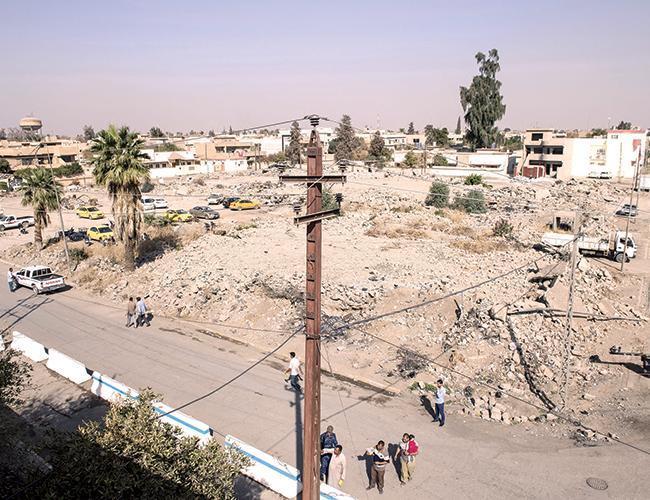
Victims of the war-torn Iraqi city of Mosul are still scarred by the horrors of the days they lived under the control of the Islamic State of Iraq and the Levant (ISIL).
In late July, Iraqi security forces wrested back control of Mosul, Iraq’s second-largest city, three years after ISIL had declared it the de facto capital of its “caliphate,” but memories of death and destruction still linger on the streets.
Hitting the road from Kirkuk to head to Mosul with Songül Çabuk, a former Iraqi Turkmen deputy, we pass through a checkpoint set up by Hashd al-Shaabi forces, also known as the Popular Mobilization Units, in the town of Dibis.
Divided by the Great Zap River, the town is inhabited mostly by Arabs and Kurds.
As the journey to Mosul continues, one comes across a new checkpoint every 300 meters. The driver of the car taking us to the devastated city asks me to act like a hearing-impaired person.
Some 10 kilometers after Dibis, an oil facility surrounded by three-meter-high concrete walls can be seen.
We reach another checkpoint, this time under the control of Peshmerga forces, nearly one and a half hours after our departure from Kirkuk; passing through it was easy.
After the Arbil junction, we head toward the town of Makhmur.
“Utmost brotherhood” is what comes to mind when seeing a spot at the entrance to the town where the Iraqi army, Hashd al-Shaabi and Peshmerga forces are on duty together.
As we get closer to Mosul, encountering scenes of devastation and debris becomes more frequent.
Even though al-Geyyara Bridge on the River Tigris is completely out of service after being targeted by bombs several times, there are passages through metal bridges that were constructed temporarily.
It’s forbidden to get close to the demolished bridge and buildings near River Tigris.
Children try to sell chocolates to passengers nearby refugee camps, which mostly houses Mosul residents.
At last, we see Mosul.
Soldiers on duty at checkpoints, covered in dust and dirt, try to normalize the environment, where disorder and chaos have loomed over for a while now. But even amid the destruction, a soldier comes into the frame wherever I direct my camera at.
Very few unveiled girls are seen on the streets, a striking reflection of living at the hands of ISIL tyranny for three years.
For Mosul residents, weeks weren’t enough to erase the horrors of the past three years they lived under jihadist rule.
Fear still dominates them as they talk about the tortures they experienced, which many of us saw on social media. While some talk about a relatively handsome man being thrown off a building over some made-up crime, others struggle to tell how their relatives died of thirst and hunger after being thrown into a massive pit outside Mosul.
“Most of them [jihadists] fled [after the city was liberated], but there are those who walk among us dressed ordinarily and without their beards,” a resident, who didn’t reveal their identity, tells daily Hürriyet.
Of all the gruesome torture methods used by the jihadists, one especially scars the memories of Mosul residents.
“Addada” can often be heard on the streets, which means female “police officers” operating under ISIL. According to Mosul residents, Addadas were called in if a woman was wearing little makeup or dressed slightly outside the strict dress code imposed by the jihadists.
Addadas then showed up at the scene and bit the arms of the women until blood came out. A woman tells us about another woman who bled to death after being severely bitten by an Addada.
One of the most tragic aspects of years under ISIL rule is the grim reality of children conceived by rape. It’s widely known that ISIL kidnapped, raped and stole women over the course of the three years. Now, a bleak future awaits the children that raped women gave birth to.
There are allegations that children rejected by their relatives are being kept in Arbil, the capital of the Kurdistan Regional Government (KRG), under state surveillance, which further adds to the obscurity of the days ahead of them.
As we are in Mosul, we try to find the Turkish Consulate, which was attacked by ISIL in 2014. We head to the Tayaran neighborhood to find the building, but debris have replaced the consulate.
Burnt roots of three palm trees, a refrigerator and a closet used to put documents is what remains from the building, which was raided by 900 jihadist militants on June 11, 2014, who later kidnapped 49 of the consulate staff.